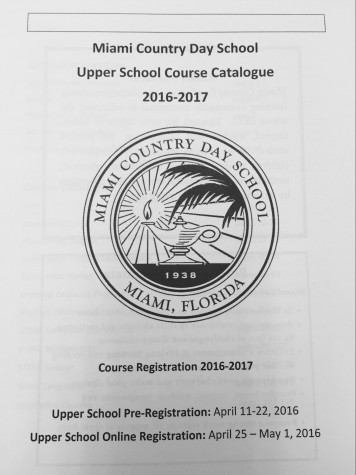Semester System Promises Continuity
Miami Country Day School has quite a few academic changes in store for the following school year. One of these changes includes the switch from a quarter to a semester system. The change will be implemented into the middle and upper school curriculums beginning next school year. The semester system will have two eighteen week semesters that are spread out over twenty weeks to account for all the days off. The first semester will begin from August 22 to January 10 and the second semester from January 23 to June 2.
This idea didn’t spring up out of the blue. During the spring of last year, middle school and upper school faculty members held meetings to discuss this proposal and everyone unanimously agreed for this new system. They believed the quarter system was an issue with the starting and stopping, the shortness of days and all the interruptions. The SAC committee (the secondary academic curriculum committee) that is made up of department chairs and division directors also took interest. Many people will probably wonder the benefits or the real reason behind this change. Mr. Bronish, the Academic Dean , gladly expressed his view on the matter.
“If you sit and look at the schedule the way it is with all the special events like homecoming week and minimester, we get a lot of starting and stopping within the quarters and it really cuts down on the number of days you have in the classroom, ” Mr. Bronish said.
Mr. Bronish has been approached by many students and parents and questioned when are the students ever in the classroom, particularly in quarter three. The third quarter is the shortest of the four quarters during the academic year and gives little room for students to improve their grade. Many students find that their teachers jam the short quarter with assessments because of the lack of school days.
“Right now in the quarter system, if you have one bad test, you may only have one left in the quarter, so you have a harder time to dig yourself out of the hole,” Mr. Bronish said. “Over an 18 week semester you’re going to have more opportunities to show your teacher that you know the material.”
This system allows for pure academic time to learn the material and more opportunities to show that the students know the material. In the quarter system, if you had a bad test, you might have only one more chance to lift your grade. Students have a harder time digging themselves out of the hole. With this 18th week semester, there are more opportunities to improve.
“This was the community working together to reach the decision. It has been a process of community discussion and decision making,” Mr. Bronish said. “In the end, we are doing this for the benefit of the students, so we can continue to do the things that make Miami Country Day special such as minimester and homecoming week.”
But this new change might have worrying implications for Spartan athletes. Under the quarter system, athletes have four weeks after August 22, and can be eligible for probation if their grades are not where they should be. Now, with the longer semester system, athletes have nine weeks to recover and bounce back if they had a bad test or missed an assignment because of a game before they have the potential for probation.
The downside of this nine week period is that athletes whose grades are below a 70, will be on probation for the entire nine weeks. The probation period is longer, but there is more time in the beginning to improve their grade. Their response to the changes will be interesting to see.
Marnie Allen, the upper school college counselor, shared her opinion on the topic.
“As far as I can remember, we have always had a quarter system. I feel that the semester system is good in that it gives you a length of time to progress because sometimes that first quarter you haven’t really gotten into it and that first quarter grade might not be reflective of the overall growth. I think the semester gives you more time to develop and improve and be a more accurate reflection of your grade.”
Ms. Martinez, an upper school English teacher, who teaches American Literature and Poetry, is intrigued by this change.
“I think this was a very informal vote if I recall. I do think that when the idea was proposed to us, it did sound appealing to me because I think it would add a little bit of breathing room into the structure of the year. Maybe that meant breathing room for the students as well, so there wouldn’t be that scrambling to finish everything for the end of a particular quarter at the end of the nine weeks, but also some breathing room for the teachers as well to give appropriate time and not rush a project and not rush the grading of the project. I was intrigued about the change from quarters to semesters.”






